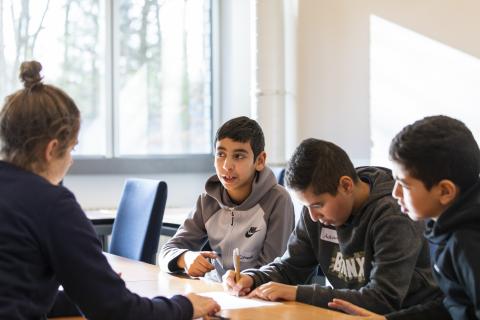Teaching at the IMC Weekend School: 'They are rightly proud of themselves'
Are rich people happier than poor people? Children of the IMC Weekend School try to figure it out in sociology classes taught by Inge Sieben, Assistant Professor at Tilburg University. Great volunteer work, in her opinion.
‘I teach about educational inequality. Actually doing something about it is important, too.'
‘What's a pie chart?’ ‘Do you have a dog?’ When she teaches at the IMC Weekend School in Tilburg, Sociology Assistant Professor Inge Sieben gets lots of questions, often very surprising ones. For instance, one pupil suddenly asked: ‘Can you die of a panic attack?’ Sieben: ‘They can become completely absorbed by the assignments. They are really concentrated when they work. And then suddenly such a question pops up.’ This is what makes teaching children different from teaching university students, Sieben thinks. For how should you react? ‘With a question like that, of course, you cannot say: continue with your assignment for the moment, we'll talk about it later. So I tried to reassure her. And then I briefly consult with the class teacher.’ Sieben likes it that her own children are about the same age because 'it sometimes feels a bit like parenting.’
Underprivileged
Her own children, by the way, were astonished. ‘Going to school on a Sunday? Of their own free will?? They thought it was something else,’ Sieben says. ‘And of course it is. They come every week, full of energy and enthusiasm. I greatly admire their commitment.’ Sieben thinks it is important as well as satisfying that she can contribute in this way. ‘I always ask students I teach to help out, to supervise a group.
'In my lectures, I regularly talk about educational inequality, about differences in opportunities. For many students, this is still rather abstract.'
They come from 'white’ schools, have highly educated parents. The Weekend School is an eye-opener for them.’ A director of one of the ‘black’ schools which the Weekend School pupils attend now teaches as a guest lecturer in Sieben’s lecture series. ‘His real-life stories make a big impression.’
Robes
The aim of Sieben’s module is, in the space of three Sundays, to give the pupils some idea of what research means, how social scientists work and what happens at a university. The pupils set up their own sociological study, including a problem, hypothesis, street survey, and poster presentation. Sieben: ‘I always ask two professors to help with the judging, in their robes. ‘What would you do different next time?’, is a frequently asked jury question. The pupils can be very eloquent on the fact that they would have preferred to interview even more young people or women, for example, in order to draw more reliable conclusions.’
Every group can decide what their study should be about. They often choose themes like discrimination, social media use, or crime. How do Christians think about Muslims and vice versa? Or: Do young people think differently about Zwarte Piet than older people? But also the question ‘Are rich people happier?’ emerged. Sieben: ‘They have wonderful research ideas. Sometimes you need to nudge them in a slightly different direction. ‘Have you every killed someone?’ does not work very well in a street survey. But they soon pick up on that. I almost never oversimplify. I just do not use hard words. They are very motivated children.’

Pie chart
The module starts off playfully with the game ‘Expedition Mundus’ developed by the Royal Netherlands Academy of Arts and Sciences, KNAW. The pupils must work as a team of scientists to chart an unknown planet. They have to collect information, exchange data, and draw conclusions. Sieben: ‘It really is a terrific game. In preparation, I played it with my co-teacher and the co-developer of this module, Tom Swelsen, and some students. We thought it was quite difficult. But the children are a lot better at it than we were! They're open-minded. For example, that a planet can have three seasons instead of four, they saw that much sooner.’
Then they get to work on their own assignment. Sieben: 'Occasionally I give a short instruction, but we let them discover a lot for themselves. In my experience, that works best. So no lengthy explanation of how you had best address people in the street for a survey, but let them practice on each other, or get it wrong and then think of how they could do it in a more effective way.’
'The final presentation with posters is very exciting for the pupils, because their parents come to watch and the jury is walking around.'
Tasks are divided: some love to use the laptop to transform the numbers into beautiful pie or bar charts. Others prefer to draw nice letters on the poster or look for photos and illustrations. Sieben: ‘There's always someone shouting that they really don't have the guts to present. But when they see their peers doing it and getting compliments, they eventually want to do it anyway. And they are proud of themselves, and rightly so.’
IMC Weekendschool Tilburg
The IMC Weekend School Tilburg has existed since 2006. Inquisitive children from groups 7 and 8 and the first years of secondary education (aged 10-14) are taught every Sunday and go on excursions that introduce them to many professional fields in order to broaden their horizons. In Tilburg, there are 140 children from ‘black’ schools in the neighborhoods of Stokhasselt, Quirijnstok, Heikant, and the Kruiden estate. Tilburg University supports the initiative by providing accommodation on campus. Many volunteers provide the lessons and supervise the children.
Date of publication: 27 February 2020
